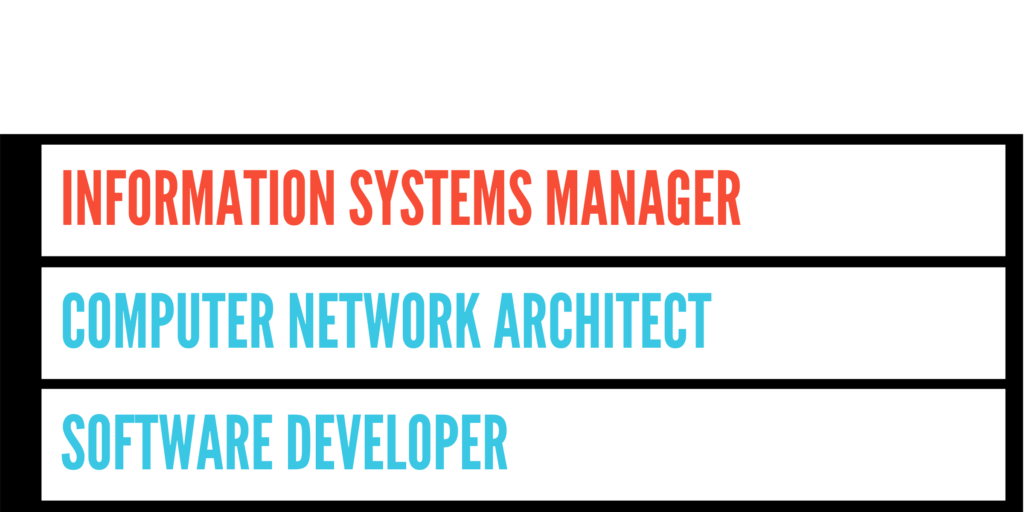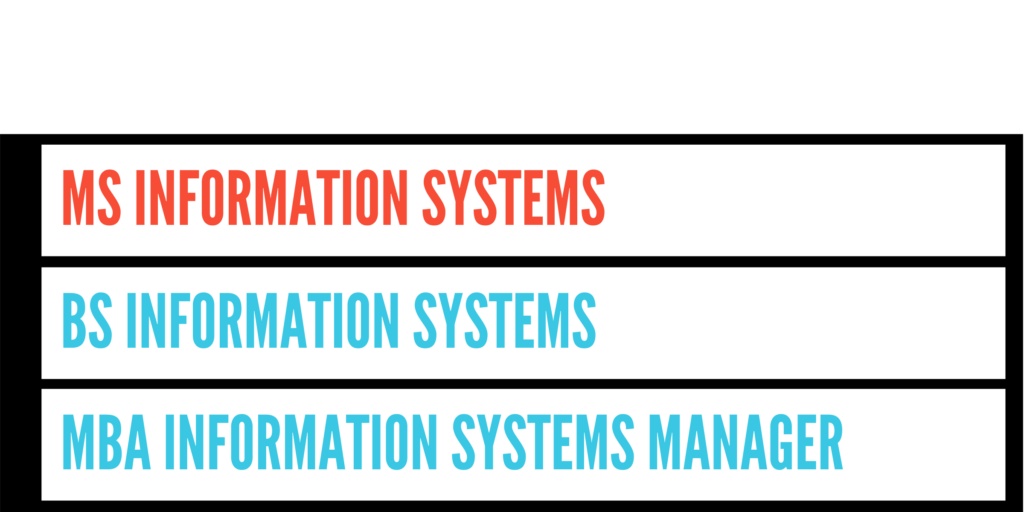An information systems degree can take you to many places and open doors to highly desirable career outcomes with lucrative salary packages, upward professional mobility, and flexible options for professional development. As a relatively new field however, the sheer number of options and burgeoning professional opportunities can overwhelm prospectives of the industry.

For that reason we have compiled a short FAQ below to direct you toward relevant resources on the topic that might make your journey easier:
Make the Most of your Education
- 50 TOP SCHOLARSHIPS FOR INFORMATION TECHNOLOGY DEGREES
- THE 20 BEST ONLINE MASTER’S IN INFORMATION SYSTEMS
- THE 20 BEST ONLINE BACHELOR’S DEGREES IN INFORMATION SYSTEMS
- TOP 20 IN-DEMAND INFORMATION TECHNOLOGY CAREERS
- THE 25 BEST ONLINE BACHELOR’S DEGREES IN INFORMATION TECHNOLOGY
- THE 25 BEST ONLINE MASTER’S DEGREES IN INFORMATION TECHNOLOGY (IT)
- WHAT ARE THE JOB PREDICTIONS FOR A PERSON WITH A DEGREE IN COMPUTER AND INFORMATION SCIENCE OVER THE NEXT TEN YEARS?
- WHAT ARE THE HIGHEST PAYING JOBS IN INFORMATION SECURITY?
Common Questions about Information Systems and IT Degree Programs
- WHAT CAN I DO WITH AN INFORMATION MANAGEMENT DEGREE?
- WHAT DEGREE DO I NEED TO BE AN INFORMATION TECHNOLOGY SPECIALIST?
- WHAT IS THE DIFFERENCE BETWEEN CYBERSECURITY AND INFORMATION SECURITY?
- WHAT ARE SOME COMPUTER LANGUAGES I SHOULD BE FAMILIAR WHEN BEGINNING A BACHELOR’S IN MANAGEMENT INFORMATION SYSTEMS DEGREE?
- WHAT IS THE DIFFERENCE BETWEEN A COMPUTER SCIENCE DEGREE AND A COMPUTER INFORMATION SYSTEMS DEGREE?
- WHAT ARE SOME OF THE TYPICAL COURSES THAT ARE PART OF A BACHELOR’S IN MANAGEMENT INFORMATION SYSTEMS DEGREE?
- WHICH IS IT BETTER TO BE STRONGER IN FOR A BACHELOR’S IN MANAGEMENT INFORMATION SYSTEMS, COMPUTERS OR BUSINESS?
- WHAT DEGREE DO I NEED TO BECOME A COMPUTER AND INFORMATION SYSTEMS MANAGER?
What is a Career in Information Systems?

In 2021 and beyond there is a new measure of value in natural resources which many argue trumps that of oil, gold, and everything that came before it. What is this natural resource? It’s information.
Information science is a huge business today and it’s only growing as we move into the future. The ‘Big Data’ revolution sends waves of change and technological innovation throughout countless industries around the world, and riding this wave are the professionals who build their careers around information technology and adjacent markets. Information systems professionals are perfectly poised to capitalize on this rising tide of opportunity.
As the value of information continues to soar, there is an increasing demand for professionals to manage said information. Information systems professionals build their careers around collecting, processing, storing, and distributing information in a variety of professional capacities. They also set objectives for an organization’s information technology programs and work to ensure that objectives are reached.
Information systems specialists work at the heart of the IT industry, and as such are positioned in an exceedingly wide range of roles–in high-tech computer science industries, software development, international corporations, federal data collection entities, and in high-end academia.
Because nearly every industry has placed a price tag on valuable intel, nearly every industry has also incentivized hiring information systems professionals who will be able to maximize the acquisition and cultivation of information. Without information systems specialists information is just numbers and letters. Information systems is the field of converting inanimate information into an actionable resource that is perhaps more valuable than even gold.
Degree Paths in Information Systems

Where one can go in their information systems career will be determined, at least in part, by where they started–which for many professionals will be an accredited degree program. From 2018-2019, the computer information systems degree was the 10th most popular degree-major nationwide with a whopping 76,482 degrees awarded
And prospective professionals of the information systems industry have numerous in-roads to consider. Whether you are a first-time student or an experienced professional looking for a career change, there are countless opportunities to accommodate your needs. Because information systems is such a central market in the technology industries, universities around the world look to meet the needs of a rapidly growing number of students who wish to devote their studies to it.
As such, there are more program options than ever before and the increasing number of such programs further increases competition between them, meaning that many of the best information systems degree programs offer highly competitive tuitions and quality of life features–such as asynchronous, part-time online learning formats that allow students to earn a degree amidst full-time employment.
Students can pursue an education in information systems through any of the following pathways:
- Associate’s of Information Systems
- Often organized into 4 semesters over two years, delivering a general curriculum.
- Associate’s programs are typically more ‘introductory’ and will have less time and resources to devote to specializations and advanced subject matter.
- An Associate’s program is an excellent option for students who have their eyes on top-end Bachelor’s programs but who may not have the academic record from high school to enable their admittance.
- Bachelor’s of Information Systems
- Often organized into 8 semesters over four years, delivering both foundational curriculums and specialized studies.
- Bachelor’s programs are typically offered in the context of more distinct perspectives–either as a comprehensive introduction to the field, or as a more specialized route of study.
- Those who wish to pursue a professional specialization will want to consider engaging the relevant specialization in their undergraduate studies–if possible.
- According to the Bureau of Labor Statistics, most entry-level information systems positions require at least a bachelor’s level education, and surprisingly, management positions also typically require only a bachelor’s.
- Master’s of Information Systems
- A Master’s of Information Systems typically requires two to four years of study.
- Master’s level education is typically characterized by in-depth inquiries into specialized studies.
- Many high-end positions in the information systems field will require graduate level education, particularly for positions in academia.
Common Specializations in Information Systems

One of the best methods for unlocking professional opportunities in the field of information systems is to specialize. For this reason, many of the best degree programs offer specialized tracks in subjects of high value to the current industry climate. So let’s take a look at the best and most common degree specializations to consider.
Business Intelligence and Data Analytics
This field is concerned with mastering the collection, cultivation, and analysis of data within the context of a certain organizational objective. For instance, many large corporations employ information systems professionals with a specialization in business intelligence or data analytics to collect and present data relating to performance metrics. This allows large corporations to monitor employee productivity and to fine-tune performance in key areas. This specialization however, can apply to a wide array of subjects.
Computer Science
Some information systems degree programs will offer a specialized track in computer science. While the information systems curriculum is generally reliant on studies in computer science to begin with, a specialization in this area suggests a more rigid focus on computer technology, applications, and software. This specialization often functions as a foundation on which to build further technical specialization in areas such as software development or other technical areas of computer science.
Cybersecurity
Cybersecurity is the subspecialty of information systems concerned with provided security and stability to a client or employing organization. Information systems professionals focus on collecting, processing, storing, and distributing information–and cybersecurity specialists focus on ensuring security throughout the numerous stages of each of these processes. Professionals can further specialize in types of security depending on their desired career destinations–in areas such as web security, network administration security, and corporate information security.
Data Management
Data management is the specialty wherein information systems professionals build expertise in various methods for handling, distributing, and processing information. These professionals often build expertise in working with various types of technology such as web scrapers and other data science tools. Data management is a high-value specialty in areas where business and technology overlap where corporations are eager to discover new applications for data. It is also a high-value specialty in tech companies that utilize web crawlers and search engine technology–both of which are applications of data management.
Health Informatics
Health informatics is the speciality wherein professionals specialize in the collecting, processing, storing, and distributing of information relating to both patients’ health and healthcare data. These professionals can work in the healthcare industry or they can work in the tech industry to develop software and applications for the healthcare industry. Because the healthcare industry is constantly in the process of adopting new technologies, there is a consistent and growing demand for information systems professionals with this speciality.
Project Management
The project management specialty refers to information systems professionals who specialize in applying their skills in the context of bringing individual projects to fruition. These professionals combine the technical expertise of information systems with business savvy to drive success in business ventures. Consequently this role is characterized by management responsibilities and as such the relevant specialty is often conferred by information systems degree programs offered by business schools, or by programs that prioritize management-focused curriculums.
Software Development
Information systems professionals often specialize in software development in order to participate in the design, development, and implementation of new ways to handle information and maximize its value. These professionals often begin with a specialization in computer science and build software development expertise in specialized information systems degree programs at the undergraduate or graduate level. Some professionals who desire to work in this area may choose to engage a software development program separately.
Maximizing Career Outcomes in Information Systems

Both one’s education and career in information systems is defined by skill-building and effective utilization of these skills. It follows that the professionals who are able to most effectively build valuable skill-sets will see the most attractive career outcomes. So let’s break down the skills that are key to success in an information systems career:
- Analytical Skills
- Big-Picture Perspectives
- Coding Skills
- Communication Skills
- Computational Skills
- Computer Technology Skills
- Creativity
- Curiosity
- Mathematical Skills
- Organizational Skills
The skills involved in an information systems career combine the technical skills of a traditional IT career with the analytical thinking and out-of-the-box perspectives associated with more creative careers. Information systems careers are constantly working to develop new methods for collecting and processing information, and as such are always on the prowl for valuable information to target.
This requires the sort of bird’s eye perspective that is more common in roles of high-end business or artistic professions. Information systems professionals have the opportunity to identify and interact with the most valuable and impactful information of our time–which will shape the shape and direction of our future. As such, numerous options for professional development are always on offer.
Countless professional bootcamps, certification programs, and skill-building programs allow information systems professionals to work toward the next level of their careers. In order to better understand which skills are most important for which duties, let’s break down the most common duties for an information systems professional:
- Recommend computer technology to executives
- Plan and direct installations and maintenance of computer technology–such as software and applications
- Provide security services for an organization’s online activities
- Provide profit-loss assessments for IT operations
- Conduct research and queries for technology to improve organizational operations
- Manage short-term and long-term personnel needs for a given project or organization
- Plan and direct the work of other IT professionals to maximize productivity and facilitate organizational effectiveness
- Work with vendors to maintain a high level of function with an organization technology
Key Developments and Trends in Information Systems Industries

The information systems field is positioned within the sector of the economy characterized by data processing, internet publishing, and other information services. The contribution of this sector to the American economy is enormous, and continues to blow past expectations. From 2007 to 2017 the contribution of $65.2 billion soared to a value addition of $263.6 billion, making it one of the most lucrative and financially robust sectors of the United States GDP.
Data processing, internet publishing, and other information services are the fastest-growing sectors of the technologies industries and continue to expand in key areas of interest to professionals–employment rates, average salaries, and upward mobility.
Enterprise software represents the primary driver of growth in the overall IT market which grossed more than $1 trillion in spending in 2019. This means that formative powers of industry are investing heavily in the appropriate software that will enable greater performance in the future. As such, information systems software development is one of the most robust and promising sectors of the job market.
Information Systems Industry Profile

Given the range of entry level opportunities in the information systems job market, it is impossible to give highly accurate, generalized information on specific job profiles. The Bureau of Labor Statistics however, provides an in-depth profile for information systems professionals who take on a managerial or leadership role. And serendipitously, managerial positions generally represent a major career aspiration for working professionals in the industry with salaries reaching more than $150,000 annually–even with minimum experience.
So let’s break down the profile of what a successful career in information systems degree might look like.
Computer and Information Systems Managers
- 461,000 jobs as of 2019
- Rate of job growth from 2019-2029 was 10%
- Top 10% of workers earned more than $208,000
- The bottom 10% of workers earned more than $90,430
- 2020 median pay was $151,150
- Equates to $72.67 per hour
- Entry level positions require a Bachelor’s degree
- Management positions require 5 years experience or more
The work environment for computer and information systems managers can vary, however most professionals work in-house with their employing organization rather than remotely. Some managers may work more than 40 hours, given the fluctuating responsibilities of a leadership role. The biggest employers of this position are as follows:
- Computer systems design and related services
- 22% of jobs
- Information
- 11% of jobs
- Finance and insurance
- 11% of jobs
- Management of companies and enterprises
- 9% of jobs
- Manufacturing
- 7% of jobs
Master’s of Business Administration
Given that one of the most lucrative career outcomes in information systems is to take on a management role, many professionals in the industry jumpstart their careers by obtaining a supplemental business degree in addition to their information systems degree. Specifically, many of the top managers in the job market hold a Master’s of Business Administration and a Bachelor’s of Information Systems or Computer Information–often with a management specialization.
For those interested in landing a management job after graduation, the ideal progression of education would be something like this: earn a Bachelor’s of Management Information Systems in 4 years, and then earn a Master’s of Business Administration with an IT specialization in 2 years.
This route could lead to entering the job market fully prepared to land a top-tier management job in just 6 years. An important note here is that while the aforementioned positions often require about 5 years of job experience, this requirement is often circumnavigated by demonstrated advanced education in management specializations.
Top Paying Industries for Information Systems Managers
Given the cost of a Bachelor’s degree and a Master’s of Business Administration, students want to know that they will see a return on their investment. So let’s take a look at the most profitable industries for this work:
Most Profitable Industries
- Information
- Median annual salary: $166,770
- Computer systems design and related services
- Median annual salary: $157,580
- Finance and insurance
- Median annual salary: $155,760
- Management of companies and enterprises
- Median annual salary: $152,480
- Manufacturing
- Median annual salary: $150,930
Most Profitable Sectors
- Other Information Services
- Median annual salary: $205,510
- 9,160 jobs
- Other Investment Pools and Funds
- Median annual salary: $199,900
- 60 jobs
- Scientific Research and Development Services
- Median annual salary: $192,870
- 10,890 jobs
- Manufacturing and Reproducing Magnetic and Optical Media
- Median annual salary: $191,700
- 120 jobs
- Cable and Other Subscription Programming
- Median annual salary: $190,690
- 1,290 jobs
Where to Look for an Information Systems Management Job

Knowing how to take advantage of geographic hotspots is nearly as important–and sometimes more important–than other forms of preparation. Some job markets are just more accommodating than others, and the healthiest job markets offer the healthiest compensation packages, however it should be noted that oftentimes hub cities for tech jobs come with disproportionately high cost of living.
With that in mind, let’s take a look at some of the most opportune states for information systems managers:
States with the most Information Systems Management Jobs
- California
- Median annual salary: $198,210
- 81,760 jobs
- Texas
- Median annual salary: $158,010
- 29,970 jobs
- New York
- Median annual salary: $193,180
- 29,050 jobs
- Illinois
- Median annual salary: $153,900
- 21,690 jobs
- Massachusetts
- Median annual salary: $165,710
- 20,320 jobs
States with the Highest Paying Information Systems Manager Jobs
- California
- Median annual salary: $198,210
- 81,760 jobs
- New York
- Median annual salary: $193,180
- 29,050 jobs
- New Jersey
- Median annual salary: $191,120
- 17,160 jobs
- Virginia
- Median annual salary: $176,350
- 14,900 jobs
- Colorado
- Median annual salary: $174,060
- 8,080 jobs
Key Takeaways
Unsurprisingly, California is a hotspot–not only in terms of number of opportunities, but in terms of the salaries on offer. While some Californian tech-hub cities face inordinately high cost of living, savvy professionals can look for cost effective living if they don’t mind commuting a bit. Otherwise, the information systems job markets in the midwest and northeast seem both highly opportune and more affordable in terms of cost of living.
